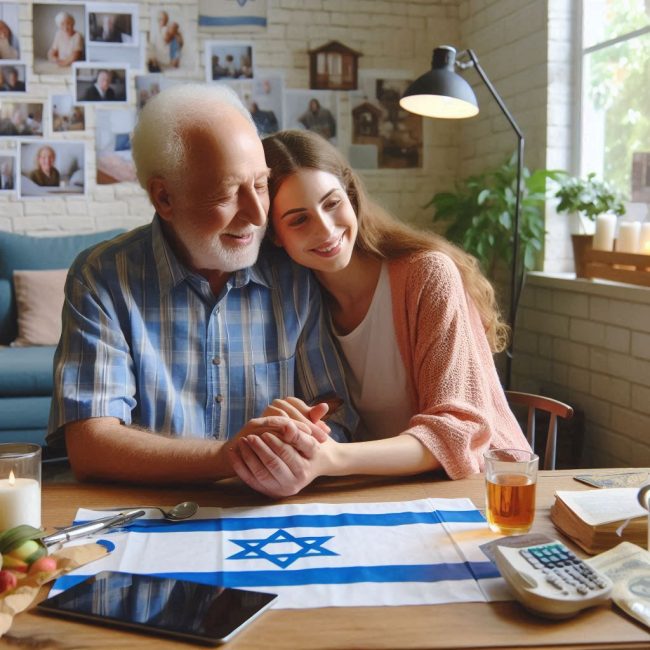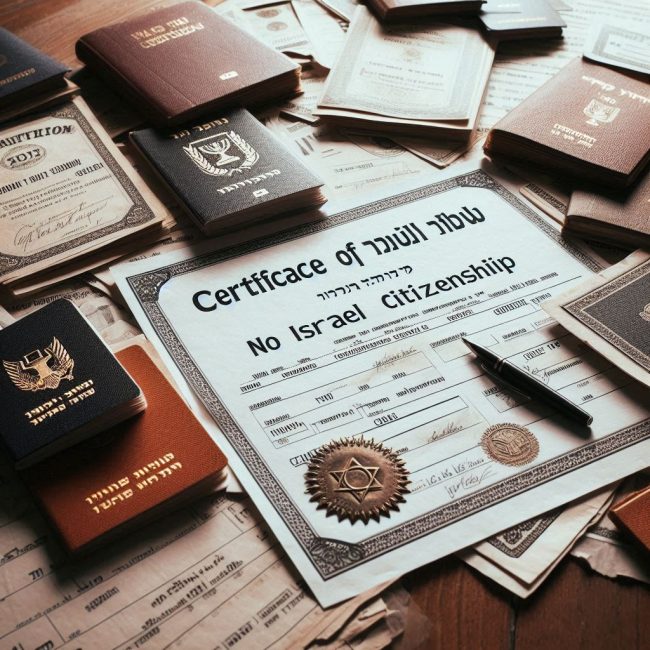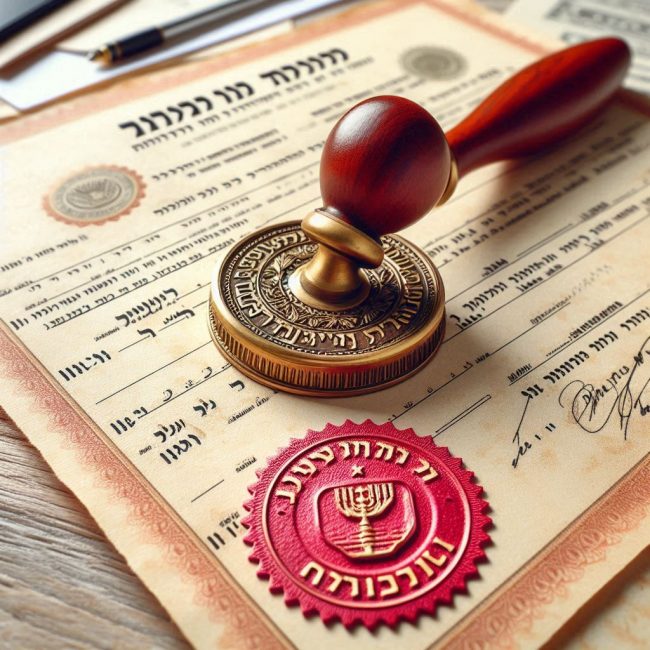We present to you the full text of the Law: “Granting status to an elderly single parent in Israel” (Noal ore kashish ve boded) in English language
We also advise you to read the article:
Reunification with elderly single parents in Israel
____________________________________
Official Regulation of the Israel Population and Immigration Authority
Publication No. 9, Directive 5.2.0033
Update date: 31.12.2023
LAW
Granting status to an elderly single parent in Israel
“Noal ore kashish ve boded.”

Law: “Granting Status to an Elderly Single Parent in Israel”. Procedure for processing applications for status in Israel for an elderly single parent of an Israeli citizen
Basic concepts and terms:
“ICE visa office” – Israel Population and Immigration Authority.
“Residence Permit” – a visa and/or permit to visit Israel.
“Invitee”– is the father of an Israeli citizen 64 years of age or older or the mother of an Israeli citizen 62 years of age or older.
“Invitee” – is a citizen of Israel
“Elderly single parent” – an elderly single parent of an Israeli citizen who has no additional children and/or spouse abroad and/or dependents under the supervision or custody of the parents
“Offices” are the divisions of the Population Administration of the Israel Population and Immigration Authority located throughout the country.
“Visa Officer” means an employee at the rank of service representative or higher in the office of Population and Immigration Management.
“Department Manager” is the head of the team dealing with the registration of applications and reception.
“Exempt from Entry Permit” – a foreign national who holds a passport from one of the countries listed in the Law on Entry into Israel, whose citizens are exempt from the need for entry permits and permits to visit Israel. Based on the Law on Entry and Visa Regulations for Foreign Nationals from 1974-1974.
“Obligated to have an entry visa” – foreign nationals who hold a passport of one of the countries whose citizens must have a visa and prior authorization to visit Israel.
“High Risk Country” – a foreign national born/having a passport from one of the countries under the special attention of Israel’s security authorities.
“Criminal record certificate” – an official document from a foreign country, issued within the last six months, about the criminal record of the invitee or the presence/absence of any criminal record, which includes information about all name changes of the invitee.
“Nativ” – Nativ Liaison Office – an Israeli government agency, subordinate to the Office of the Prime Minister, established to liaise with Jews of the Soviet Union and Eastern Europe, to coordinate the struggle for their right of repatriation and to organize their departure to Israel. A reference unit of the Prime Minister’s Office.
Procedures for handling requests and appeals against decisions of the bureau and apparatus of the Israel Population and Immigration Authority. (Directive 1.6.0001)
General provisions of the procedure
The purpose of this procedure is to regulate the processing and review of applications for status in Israel for an elderly single parent of an Israeli citizen and applications for visa extensions, as detailed below:
1. An elderly single parent of an Israeli citizen may obtain the right to stay legally in the State of Israel in order to reunite with his/her child, provided that the child assumes the obligation to support the visiting parent and meet all of his/her needs, if the petition is considered favorably, in accordance with the regulations detailed in this procedure.
2. According to the law, it is possible to invite an elderly single parent, provided that the father of the Israeli citizen is 64 years of age or older at the time of application, and the mother of the Israeli citizen if she is 62 years of age or older. It should be clarified that according to the existing procedure, which takes into account the presence of an Israeli citizen in Israel without a parent who is elderly and single abroad, it will be possible to issue a summons and regulate the status of stay of only one parent (either the mother or the father).
3. In order to apply, in accordance with the procedure, for a parent to be invited, the inviting parent needs to sign up for an online meeting at the following link: https://www.gov.il/he/service/schedule_meeting_visas_department
When requesting an extension of stay, the application must be submitted at least 90 days prior to the expiration date of the visa.
4. In cases where the invitee’s country of origin/citizenship is identified by security authorities as a high risk country, the invitee’s details will be passed to the security authorities for verification and appropriate advice before the visa application is approved.
5. An invited citizen of the former Soviet Union will be referred to the Nativ office by the Population Management Department. Upon application, the invitee may be required to submit additional documents such as various certificates and references in accordance with Nativ’s procedures.
6. If the invitee has been in Israel illegally for more than 6 months at the time of application, the application will be rejected and the citizen will be forcibly removed from the country. After leaving Israel, he/she will be able to submit a new application, which will be processed in accordance with the provisions of this procedure.
7. The said procedure cannot be applied to those whose entry into Israel was based on false information and/or forged documents and/or whose status in Israel was previously revoked.
8. During the processing of the application, in certain cases and at any stage thereof, the inviter may be summoned for an interview at the visa office appropriate to his/her place of residence. Additional documents may be requested, analyzed and/or a bank guarantee may be required in accordance with the generally accepted guarantee procedure.
9. The decision of refusal received under this procedure will be delivered to the inviter in writing by registered letter. The refusal will be reasoned, but will be given the option of filing an application to appeal the decision, in accordance with Directive 1.6.0001, or filing an appeal with the Court of Appeals, in accordance with Section 13 23 of the Entry into Israel Law of 1952, depending on the circumstances of the case. The decision will be electronically recorded in the relevant databases. Restriction is possible according to the decision and indicating the date of delivery or the registered postal number, as the case may be. The applicant may receive the decision electronically, or by mail with a notification, or in person at the visa office.
10. A client appealing a decision made under this procedure must appeal in writing without delay and without delay, no later than 21 days from the date of the decision. If the appeal is filed after the deadline, the appeal will not be considered and will proceed in accordance with Directive 1.6.0001.
11. At each stage of the processing of the application, a foreigner who has been in Israel legally for more than six months must apply to the visa office for an extension of the residence visa. Attention must be paid to the processing rules in accordance with Directive 5.2.0015. Upon application to the visa office, an internal check will be conducted to determine whether the foreigner has committed any offenses within the last 6 months.
12. The visa officer should ensure that any procedure for processing and/or issuing a decision on the application submitted is updated and entered into databases in electronic form, as well as in a special application file. And that all application materials are scanned into a computerized archive.
13. Re-entry visa – a person invited for a residence permit under this procedure may travel abroad during the period of validity of the visa. In the event that he/she needs to return to Israel, he/she must obtain a re-entry visa (“intervisa”) in advance from the visa office, since the residence permit expires at the time of his/her departure from Israel.
14. The provisions of this procedure shall not supersede the provisions established by law and the regulations and decisions of the Government established thereunder for the time being.
15. It is within the authority of the visa office to revoke a residence permit or visa, in the event of a finding of non-compliance with procedures and/or upon finding that full and complete information has not been provided and/or a reasoned recommendation from a public authority to revoke the invitee’s right to stay and/or use false documents for the purpose of obtaining a license or status – in previous applications or the current application, the visa office may, subject to a hearing, immediately revoke the visa.
Law: “Granting Status to an Elderly Single Parent in Israel” (Noal ore kashish ve boded)

We also advise you to read the article:
Reunification with elderly single parents in Israel
Purpose of procedure
To determine the procedure for processing applications for the granting and renewal of a residence permit in Israel for an elderly and single parent (who has no other children and/or spouse abroad and/or dependents in the custody of the parents) citizen of Israel.
Conditions and requirements
1. You can sign up to apply at: https://www.gov.il/he/service/schedule_meeting_visas_department
2. In the event that the called relative is already in Israel, the presence of the invitee and the invitee at the visa office in the place of residence is required. In the place of residence of the invitee, in order to apply for an extension of the residence permit/change of visa type (Ash/3 form). In order to apply for visa extension or change of visa type, it is necessary to apply to the department at the place of residence of the inviter (form Ash/3).
In case the invitee is abroad, the mandatory presence of the invitee at the visa office of the place of residence of the invitee is required in order to apply for an entry visa (form Ash/3).
3. The passport must be valid for at least two years. When the invitee is abroad, a photocopy of the aforementioned passport must be provided.
4. An up-to-date passport photograph of the invitee.
5. Submission of documents of the invited person, original, duly certified and translated, in accordance with the terms of Directive 1.3.0001.
List of documents:
• Original and notarized translation of the applicant’s birth certificate. The applicant’s birth certificate submitted in violation of the existing rules and not legally legalized shall be considered invalid and the request shall be definitively rejected. Except for authentic birth certificates issued before 1998 in the countries of the former USSR, for which there is no need for mandatory verification.
• Name and surname change certificate, as well as its notarized translation confirming the change of name (personal/family) of the invitee, if there have been changes.
• The validity of the certificate or certificate of change of surname and name stamped with an apostille must be at least six months. The visa office may also require an additional certificate of marital status. Depending on the data in the application, and if necessary, additional documentation may be required regarding personal status, prior to current status, and at the judgment/consideration of the visa officer as indicated below. The department may require additional family status documentation based on the decision or recommendation of the Israeli Interior Ministry official.
• Also, the visa officer needs to be provided with previous family status certificates issued by the country of origin.
• If we are talking about a country that does not issue a certificate of previous marital status, it is possible to make a notarized declaration of the invitee’s previous marital status, which will be notarized and signed at the Israeli consulate of the country from which the invitee came.
The certificate of criminal record of the invitee is valid for six months. If the invitee has been in any other country for more than six months, he/she may be asked for a criminal record certificate from the country in which he/she resided (not his/her country of origin). From the federal authorities or the regional authorities to which the invitee belongs, depending on his place of residence. If an incomplete criminal record certificate has been submitted, it is considered that no certificate has been submitted at all.
6. Signature of the invitee on a written statement in front of the visa officer/Israeli consulate abroad that he/she has no other children abroad besides the invitee.
7. A motivation letter from the invitee with a detailed description of where he lived until today, where he worked, who his friends were, where and with whom he celebrated holidays. The nature of the relationship with the inviter, etc. and why he is interested in obtaining status in Israel.
8. A letter of motivation from the invitee detailing where the invitee will reside in Israel and who will fulfill all of their needs.
9. Obligation of the inviter to take care of the needs of the invitee. If the application is approved, the issuance of the visa requires the provision of health insurance for the elderly parent as well as a residence permit. A valid health insurance policy for the elderly single parent invited during the period of validity of the B/2 or B/1 visa. The provision of health insurance is a prerequisite for approval of the application and entry visa.
10. Any additional document and/or certificate may be requested at the discretion/determination of the office staff member.
11. Issuance of the permit requires payment of a state fee, in accordance with the existing tariffs.
Visa application procedure
1. An employee of the office will check that the signed questionnaire is filled in correctly and that the data of the invitee necessary for contacting him/her (telephone numbers of family members and relatives, means of communication, e-mail addresses, etc.) are correct.
2. A check will be made and it will be determined whether the invitee has presented a valid passport as required.
3. The department staff member enters the personal status changes into the computer system labeled “request for status for single elderly parent” and all data that was contained on the form submitted and completes all required sections.
The visa officer will inform that the application for the status and its details have been entered in the “registration sheet” and will open a file called “elderly single parent”.
The data on the application form will be compared to information present in computer systems, including:
1) Entry and exit data of the invitee.
2) Refusals and authorizations at consulates abroad.
3) The existence of additional requests on the invitee.
4) Whether the invitee has previously submitted additional requests for a residence permit and the current status of their processing.
5) Checking in the electronic system is done in order to determine whether the person being checked does not have an ID card number, and whether the invitee did not have any status in Israel. Whether the invitee did not have a residence permit in Israel, whether the invitee had open cases to obtain any status in Israel and, if so, whether they are also attached to the request. If it is found that the invitee has Israeli citizenship or permanent residency status in Israel, the request will be rejected. The invitee will be notified in writing.
(6) The verification shall include verification of all restrictions referred to in the directive on the requirements for additional preliminary verification. Verification of the existence of any restrictions on the invitee. If restrictions are found, the procedure will proceed according to the existing rules.
4. A branch staff member will check the status of the invitee.
(1) If the nationality of the invitee is in doubt, proceed in accordance with the procedure for nationality verification procedure 4.9.0001.
2) If the inviter is not an Israeli citizen, the request must be rejected in its entirety in an official letter of justification.
3) A check will be made to determine whether the inviting applicant’s center of life is indeed in Israel. If the center of his/her life is not in Israel, the application will be denied and the applicant will receive a response in an official letter of justification.
5. The visa officer will verify that all the requirements in the section above have been met, as well as the documents attached to the request.
If the application is not accompanied by the required documents, the application will be rejected and this will be notified in writing. The letter will also inform the applicant that after rejection, there is the possibility of appealing the decision, in accordance with Directive 1.6.0001. If the invitee is in Israel, he/she will be required to leave the country within 14 days or upon the expiration of the visa issued to him/her. A copy of the letter will be sent to the Office of Enforcement and Foreigners’ Affairs.
6. If at the time of application, the invitee has been in Israel illegally for more than 6 months, the application will be rejected with expulsion from Israel. After leaving Israel, a new application may be submitted and will be processed in accordance with the provisions of this procedure.
7. If it is determined that the invitee has entered Israel now or in the past on the basis of false information and/or forged documents and/or his/her status in Israel has been revoked, the Head of the Visa Department has the right to reject the request in its entirety. If the invitee is in Israel, it is necessary to request his/her departure from Israel and notify the Office of Foreigners’ Affairs.
8. Appeal to authority:
А. A questionnaire should be sent regarding the invitee.
B. If the invitee remains in Israel for more than six months, a computerized inquiry will be sent to the Police regarding the invitee.
C. Security factors: If the invitee is from a high-risk country, a request must be sent to the security services. For this purpose, the invitee must fill out a short CV form, which the office will forward to the security authorities for further verification and recommendations.
D. The invitee from the former Soviet Union is summoned to a Nativ office where a number of additional documents may be required. In the case of an applicant to move to Israel, he may be required to present additional documents in accordance with the established requirements of the Nativ organization.
It is necessary to send the application form electronically to Nativ, attaching all the necessary certificates and references in order to receive a recommendation from the organization. The invitee may extend the period of validity of the residence permit (visa) in the country until receiving an official response from Nativa.
9. The “Nativ” checks the connection between the invitee and the inviter and, if no contradictions and discrepancies with the directive are found, the visa officer grants permission and writes a report with all notes and explanations in a computerized system of a special archive. The request and the entry permit, if granted, are also entered there.
10. Citizens from countries in need of an entry visa to Israel forward the obtained entry permit to the Israeli Consulate with recommendations, together with a list of all restrictions and the submitted scanned documents, which are later entered into a computerized electronic archive. The visa decision will be sent in writing by mail. If the invitee is already in Israel, then both: the invitee and the inviter apply to the visa office for the issuance of a visa.
12. If the visa officer finds obstacles to approving the application according to this procedure, he/she will forward the decision to the head of the visa office. If the Head of Department decides to approve the request, the inviter and invitee will be required to visit the visa office for further processing and visa issuance. If the decision is made to deny the request, the processing will continue in accordance with Section 5.
12-А. Approval of Application:
If it is decided to approve the application, the residence permit will be issued according to the age of the invitee at the time of application.
As described below:
Law: “Granting Status to an Elderly Single Parent in Israel” (Noal ore kashish ve boded)

Visa:
1-A) If the invitee is 62-65 years old – he will be granted a “B/2 elderly parent” type residence permit in Israel for a period of one year, renewable for a cumulative period of up to 27 consecutive months (according to the Entry into Israel Law, 1952-5772).
Upon completion of a cumulative stay of 27 consecutive months on a “B/2 Elderly Parent” visa and if the invitee has not yet turned 65 during this period, a “B/1 Elderly Parent” visa may be approved for up to nine months until the invitee turns 65.
Once the invitee reaches the age of 65, the “B/1 elderly parent” visa can be extended for a further two years (one year in each extension).
2-A) Invitees 65 years of age or older – B/1 elderly parent visa will be issued for a period of two years (one year in each extension).
3-A) Invitees aged 70 years and above – a “B/1 elderly parent” visa will be issued for one year.
4-A) Invitees 75 years of age and older are issued a temporary residence permit type “A/5” for a period of two years. With the need to renew it once a year.
12-B. Invitational Visa:
1-B) Invitees aged 64-67 – “A “B/2 visa for elderly parents” type “B/2” is issued for a period of one year, and then extended cumulatively for up to 27 consecutive months (in accordance with the Entry into Israel Law, 1952-5772).
Upon completion of a cumulative stay of 27 consecutive months on a B/2 elderly parent visa and until the invitee reaches the age of 67 during that time period, a B/1 elderly parent visa may be granted for up to nine months until the invitee reaches the age of 67.
When the invitee reaches the age of 67 years, the “B/1 Elderly Parent” visa can be extended for a further two years (one year in each extension). It is emphasized that these two additional years are necessary for the period of previous stay on the “B/2 Elderly Parent” visa as indicated above.
2-B) Visitors aged 67 years or older will be granted a “B/1 elderly parent” visa for a period of two years. With mandatory renewal every year.
3-B) Visitors aged 70 years or older will be granted a “B/1 visa for elderly parents” for a period of one year.
4-B) Invited persons 75 years of age or older will be granted a temporary residence permit type A/5 for a period of two years, with mandatory renewal every year.
12-C. In case the invitee had a B/2 visa and was subsequently issued a visa on this basis, it is necessary to extend the B/2 visa before applying for 27 months, in accordance with the directive. At the end of the period of stay on the B-1 visa, as stated in the directive, if there are no restrictions, the head of the visa department is authorized to grant the invitee a residence permit and a temporary residence permit A5 for a period of 2 years with mandatory renewal every year.
12-D. At the end of the period of stay on a B/1 visa as indicated above and in the absence of irregularities in accordance with the provisions of this procedure, the head of the visa office may approve the issuance of a temporary residence permit of type A/ 5 for a period of two years, with mandatory renewal every year.
12-E. After two years of validity of the temporary residence permit type A/5 and if there are no violations by the invitee, in accordance with the provisions of this procedure, the head of the visa department may grant the invitee a permanent Israeli residence permit, in accordance with Directive 5.2.0023.
12-F. After one year as a permanent resident of Israel, and provided that the invitee and the invitee meet the criteria set forth in this procedure, including having a center of life in Israel, and subject to the usual conditions for granting residency and citizenship, if it is not contrary to public policy, the parent may undergo the naturalization (citizenship) procedure, according to Directive 4.4.0001, if he or she wishes.
13. Applications for visa extensions in the above-mentioned order shall be submitted in person in the presence of the inviter and the invitee at least three months before the expiration date, after prior appointment and application at the following link: https://www.gov.il/he/service/schedule_meeting_visas_department.
14. At every stage, both before extending the validity of an existing visa and before changing the type of visa, up-to-date checks must be carried out to ensure that the center of life of the invitee and the inviter remain invariably in Israel. That according to the “Entry Law” to Israel and according to the “Citizenship Law” there are no obstacles of a criminal nature, or security threats that are contrary to Israeli public policy. Law: “Granting Status to an Elderly Single Parent in Israel” (Noal ore kashish ve boded)
If it appears that, nevertheless, there are circumstances contrary to approval of the application, the case will be reviewed in a personal interview to be conducted with the invitee in accordance with procedure 5.1.0013 to ascertain the change/clarification of all circumstances.
15. If the visa officer finds that the visa extension application meets all the necessary conditions and there are no obstacles to extending the visa under this procedure, the invitee will be summoned to the visa office to extend the current visa for another year.
16. If the visa officer discovers any obstacles to extending the validity of the visa in accordance with this procedure, he/she will forward the request to the head of the visa office who will decide whether to extend the visa. The decision will be made in accordance with section 9. The inviter and the invitee will be summoned to the office for further processing and issuance of the visa. If it is decided not to issue a visa, the processing of the request will continue in accordance with section 5.
17. In the event of a refusal, this procedure requires that the invitee be summoned to the visa office, handed a reasoned letter of refusal, indicating the possibility of appeal, in accordance with Directive 1.6.0001, and that the case be closed with the notation “refused” in the computer database. If the invitee is in Israel and the request is denied, the letter must state that the invitee must leave the country within 30 days from the date specified in the letter. If the invitee does not appear at the visa office in the prescribed manner, the denial letter will be sent by registered mail and the registered mail number will be registered. All documents must be scanned electronically and placed in a computerized archive.
18. If it is reported that there has been a break in ties with another child living abroad, the burden of proof of the break in ties lies on the applicant for residency in Israel and he must submit all relevant documents. He must submit declarations from family members that prove the break in the relationship and other documents that can be attached to the declaration. If the head of the department concludes that the connection was broken with another child abroad, the application will be forwarded for further guidance to the head of the regional branch of the Ministry of Interior in the place of residence, who has the authority to make decisions and authorizations regarding residency status, in accordance with the law.
19. An invitee whose request has been granted based on evidence of complete severance of contact with a child residing abroad and it is determined that there has been a material change in circumstances since the request was approved, will be forwarded the decision of the Visa Director who has the authority to approve or deny the application.
20. If the invitee does not meet the criteria set out in this procedure, as he/she is not single and the relationship between the invitee and the invitee is not proven, the opinion of the Head of the Visa Office will be taken into account. In addition, the request with the recommendations of the Head of the Visa Office may be referred to the Humanitarian Commission, which will consider the case in accordance with Directive 5.2.0022.
21. An invitee whose request has been rejected, according to this procedure, and who has left the territory of Israel, will be entitled to apply for a B/2 tourist visa, which will be processed according to the procedures of the Ministry of Interior.
Conclusion
Applications submitted before the date of updating of this law on which a decision has not yet been taken – will be considered in accordance with the provisions of this directive.
Article on the topic
It is highly recommended that you read the article on the topic:
Reunification with elderly single parents in Israel
Consultation and Questions
If you have any questions about the Law: “Granting status to an elderly single parent in Israel” (Noal ore kashish ve boded), we recommend that you get a full consultation with a lawyer: Our contacts.
______________________
Below you will find a handy navigation box on the topic Family Reunification in Israel.
- Reunification with elderly single parents in Israel
- Law: “Granting status to elderly single parents in Israel”
- Husbands, wives, and same-sex spouses of Israeli citizens (STUPRO procedure)
- Status for parents of soldiers in Israel
- Children from previous marriages in Israel (STUPRO procedure)
- Inviting grandparents to Israel
- Israeli citizenship for minor children of non-Jewish spouses of Jews
- Israeli citizenship for widows or widowers of Jews
- Israeli citizenship for children born out of wedlock
- Humanitarian visa for Israel





